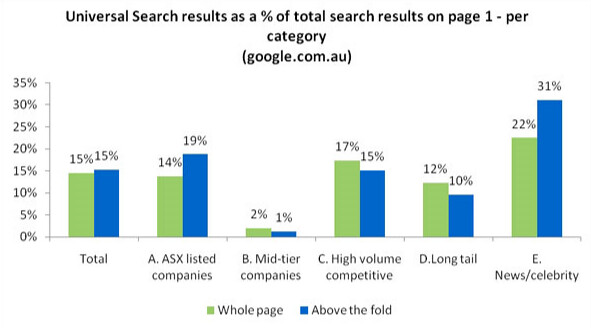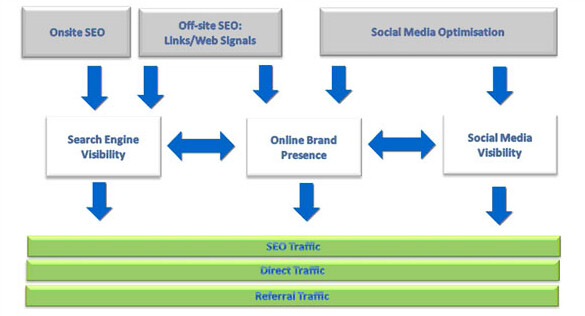Universal Search Occurrences and Types in Google.com.au
Recently, we noticed many more Universal Search results appearing in the Google.com.au SERPs. We performed some testing on the number of occurrences and the type of Universal Search results to provide some actionable insights and data to back up our observations.
In addition, we wanted to test what Marissa Mayer, the Google VP of Search Products & User Experience stated in November 2009. In the interview, she noted that when Universal Search launched in 2007 a Universal Search item appeared in 4 percent of search queries, whereas in November 2009 a Universal Search item appeared in 25 percent of search queries.
We selected a sample of different search results in Google.com.au (searched from an Australian IP and eliminating the impacts of personalised search) and recorded the occurrences and types of Universal Search results. We gathered this data across a number of different keyword groups including brand, high-volume, mid-tier, long-tail and celebrity- and news-related keywords. We then tracked those search results over a period of days to determine the level of change.
Please note that these are based on a sample size and are based on an average across the sample set. The results of our research are outlined below:
A) Percentage of Times a Universal Search Result Appears on Page 1
Our research shows that:
- 86 percent of all searches returned a Universal Search result on page
- 74 percent of all searches returned a Universal Search result above the fold on page 1.
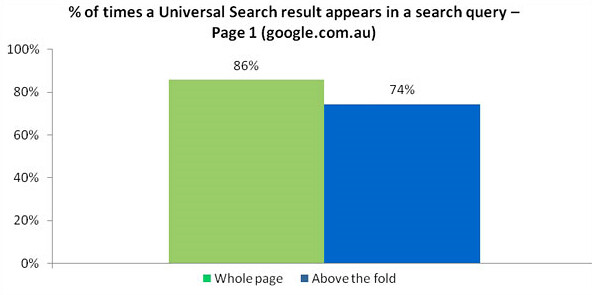
Thus in Google.com.au, we are seeing significantly more Universal Search results than the 25 percent quoted by Google in November 2009. If you are looking for a good reason to optimise for Universal Search, this is it.
B) Universal Search Result Occurrences on Page 1
Our research shows that:
- In terms of search results (note: for the purposes of this analysis, a result is a group of related links. For example, a group of 7 Google Places links is counted as one Universal Search result):
- There are 12 search results on page 1; 2 being Universal Search results (15 percent of the search results) and 10 being text search results.
- There are 7 search results above the fold on page 1; 1 being a Universal Search result (15 percent of search results) and 6 being text search results.
- In terms of links:
- There are 16 search result links on page 1; 6 being Universal Search results (36 percent of the search results) and 10 being text search results.
- There are 10 search result links above the fold on page 1; 4 being Universal Search results (39 percent of search results) and 6 being text search results.
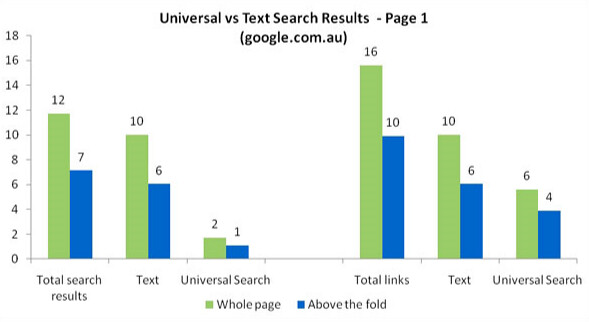
C) Universal Search Results as a % of Total Search Results – Split by Keyword Type
Our research shows that:
- The % of Universal Search results on page 1 varies significantly across keyword groups.
- News/celebrity keywords have the highest % of Universal Search results on page 1.
- Mid-tier company keywords have the lowest % of Universal Search results on page 1.
- ASX listed company keywords have a much higher % of Universal Search results on page 1 than mid-tier company keywords.
- High-volume head term keywords have a higher % of Universal Search results than long-tail keywords.
D) Tracking of Search Results Over a Period of Days
Our research shows that:
- There is minimal change in Universal Search results from day-to-day (whole page and above the fold).
- The number and type of Universal Search results remained reasonably constant.
- The number of links within a Universal Search results varied somewhat.
- News/celebrity search results showed the most variation from day-to-day.
E) Types of Universal Search Results
Our research shows that:
- News is the most commonly appearing Universal Search result both on the whole page and above the fold – 53 percent of searches contained a News Universal Search result.
- The most frequently occurring Universal Search results in order of frequency are:
- News
- Local
- Video
- Images
- Blogs
- Real time
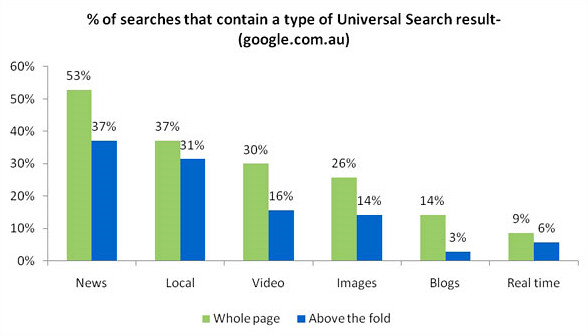
It is clear from the above research that Universal Search is a key component of the Google search results and the number and type of Universal Search results is growing.
In addition, in the November 2009 interview Marissa Mayer stated the following when asked if Universal Search was considered complete:
It’s still a very living, breathing thing. Now we have multiple teams: We have a local [search] universal team, an image [search] universal team, the product [search] universal team. They’re all looking at how can we do an even better job ranking and triggering this content.
Key Actions
What can be done to take advantage of the increased prominence of Universal Search and stay ahead of your competitors?
1. Optimise All Digital Assets
Ensure you have a strategy in place to optimise all your digital assets to take advantage of the extra ranking opportunities available (86 percent of all searches contain a Universal Search result and 15 percent of the search results on page 1 are Universal Search results). Protect against organic results being pushed below the fold (15 percent of search results and 39 percent of links above the fold, are Universal Search non-text search results).
2. Add Engagement Objects to Landing Pages
Ensure you include Engagement Objects™ on all landing pages. Engagement Objects™ are non-text elements on a page which draw attention and elicit user involvement, such as images, videos, Flash objects, audio, maps, news, books, widgets, feeds, interactive games and tables. We believe that the search engines will rank pages highly that have a high engagement with users.
3. Use Digital Asset Optimisation and Distribution to Improve Online Presence and Visibility
Digital asset optimisation and distribution (or Universal Search Optimisation) will improve search engine visibility, online brand presence and social media visibility, and these in turn will support each other, leading to higher rankings and traffic.
4. Leverage Traditional SEO Strategies
There are many specifics that need to be done to rank highly for each of the Universal Search results but many of the tried and tested standard SEO strategies still apply. Ensure you get the foundations in place as outlined in the SEO Hierarchy of Needs and then apply item specific strategies to optimise further.
26,000+ professionals, marketers and SEOs read the Bruce Clay Blog
Subscribe now for free to get:
- Expert SEO insights from the "Father of SEO."
- Proven SEO strategies to optimize website performance.
- SEO advice to earn more website traffic, higher search ranking and increased revenue.

LEAVE A REPLY





